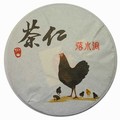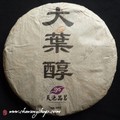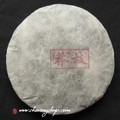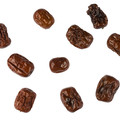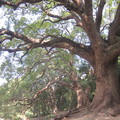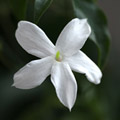Gushu - Yunnan - 2012
Tea by type
Tea by region
Tea by years and other
Luo Shui Dong 2012 Spring
 1 review
1 reviewThis cake is made from high quality gushu leaves sourced from Luo Shui Dong 落水洞 - a famous puer producing village in Yiwu. The farmers here are primarily Han ethnicity, known for their excellent hand-processing technique. This early spring tea produces is a clear bright yellow liquor, with a sweet, buttery mouthfeel. Because it is easy to drink when young, Luo Shui Dong is a good entry point for those new to sheng (raw) puer, or those who don’t like bitter or astringent flavors.
2012 Mangfei "Da Ye Chun" Early Spring Raw Puerh Cake 400g
 1 review
1 reviewThis high quality old tree tea cake come from a small shop in Yongde. Using early spring material from tea trees about 80-300 years old. Mangfei is one of Yongde high mountains. Using traditional processing techniques -“sha-qing”(kill-green) in wok and sundried and carefully pressed to this 400g cake. Smell of dry leaves is strong and great. Tea soup is yellow green, sparkish clean and fragrant. Full, thick, with fast huigan. Aftertaste is floral sweet. This tea have some fantastic cooling...
2012 Mangzhi Huang Shan Cha Xiao Bing 200g
 1 review
1 reviewThis tea came from Mangzhi mountain which is located in the west of Xiangming village Mengla county, and next to the Gedeng mountain. Mangzhi tea mountain once had a very glorious history, but suffered a setback in the local wars during the end of the Qing Dynasty. Early spring harvest from wild arbor tea trees. Traditional “sha-qing” (kill-green) processing in wok and sun-dried. Select maocha was pressed by stone to this small pretty cake. A pleasing depth of...
2012 Chawangpu Yiwu Zhangjiawan Gu Shu Xiao Bing Cha 200g
 0 reviews
0 reviewsOur Yiwu gushu for this year comes from an old village in Mansa area - Zhang Jia Wan Lao Zhai (张家湾老寨). Zhang Jia Wan Lao Zhai is a village more than 30km away from Yiwu town, and 13km from Zhang Jia Wan Xin Zhai(张家湾新寨), bordering Laos in the south. There is big area of ancient tea trees garden. Many of them was chopped down or burned around 1981. The stance to "gu cha shu" was very different at that time. Maocha cost only a fraction of today's price and old high trees were a...
Theme
Quotes
„Smokiness
The art of making tea from ancient tea trees is very old. Hand-roasting is not easily mastered. Any slight error will influence the taste of the tea. Smokiness or yan wei is one example but it should be distinguished from a burned flavour which is described as hu wei. The latter, typically arises when tea is not well roasted and is, unfortunately, not uncommon. Yan wei or smokiness is caused by oven drying. “
Latest posts
01.01.2016 @ 18:14:35 - Eternal Spring:
WeRateTea.com wish you all the best for 2016!...
07.12.2015 @ 09:07:02 - sypalino:
I decided to taste this tea 2 weeks after delivery. The cake is lightly pressed, so...
09.11.2015 @ 21:58:19 - Eternal Spring:
Comparison of 2013 Bada Pu-erh.sk with <a...
09.11.2015 @ 09:34:07 - Eternal Spring:
Lao Yu 2013 is now about 2,5 years old tea and out of this 1,5 year stored in Europe....
09.11.2015 @ 09:33:11 - Eternal Spring:
Comparison of all three Lao Yu is now done :)
15.10.2015 @ 11:06:37 - Eternal Spring:
2015 Chawangpu Collection – I can only tell, that all teas are very good :)
09.10.2015 @ 10:31:19 - Eternal Spring:
It was quite long and difficult tasting to make a decision… There is still quite...
24.01.2015 @ 16:55:57 - Eternal Spring:
WeRateTea.com wish you all the best for 2015!...
30.12.2014 @ 17:19:22 - Eternal Spring:
"FT(For Taiwan)" means this brick was a special order of "Fei Tai" Company. Fei Tai...
13.08.2014 @ 18:24:28 - Eternal Spring:
We compared two teas from Youle. 2005 Jinuo Shan You Le "Red Sun Drum" and 2009...
Tea by region
We will help you with tea selection.
Do you like quality loose tea?
We will help you to find the right one for you. Be inspired by tea ratings of other tea lovers. Rating stars could help you.


Review your cup of tea.
Review the tea you are drinking and help other tea lovers to find the right cup of tea.






 Shops
Shops
